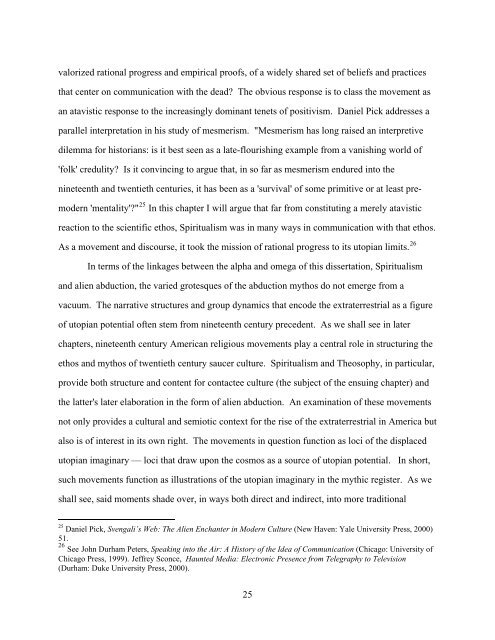A Genealogy of the Extraterrestrial in American Culture
A Genealogy of the Extraterrestrial in American Culture
A Genealogy of the Extraterrestrial in American Culture
You also want an ePaper? Increase the reach of your titles
YUMPU automatically turns print PDFs into web optimized ePapers that Google loves.
valorized rational progress and empirical pro<strong>of</strong>s, <strong>of</strong> a widely shared set <strong>of</strong> beliefs and practices<br />
that center on communication with <strong>the</strong> dead? The obvious response is to class <strong>the</strong> movement as<br />
an atavistic response to <strong>the</strong> <strong>in</strong>creas<strong>in</strong>gly dom<strong>in</strong>ant tenets <strong>of</strong> positivism. Daniel Pick addresses a<br />
parallel <strong>in</strong>terpretation <strong>in</strong> his study <strong>of</strong> mesmerism. "Mesmerism has long raised an <strong>in</strong>terpretive<br />
dilemma for historians: is it best seen as a late-flourish<strong>in</strong>g example from a vanish<strong>in</strong>g world <strong>of</strong><br />
'folk' credulity? Is it conv<strong>in</strong>c<strong>in</strong>g to argue that, <strong>in</strong> so far as mesmerism endured <strong>in</strong>to <strong>the</strong><br />
n<strong>in</strong>eteenth and twentieth centuries, it has been as a 'survival' <strong>of</strong> some primitive or at least premodern<br />
'mentality'?" 25 In this chapter I will argue that far from constitut<strong>in</strong>g a merely atavistic<br />
reaction to <strong>the</strong> scientific ethos, Spiritualism was <strong>in</strong> many ways <strong>in</strong> communication with that ethos.<br />
As a movement and discourse, it took <strong>the</strong> mission <strong>of</strong> rational progress to its utopian limits. 26<br />
In terms <strong>of</strong> <strong>the</strong> l<strong>in</strong>kages between <strong>the</strong> alpha and omega <strong>of</strong> this dissertation, Spiritualism<br />
and alien abduction, <strong>the</strong> varied grotesques <strong>of</strong> <strong>the</strong> abduction mythos do not emerge from a<br />
vacuum. The narrative structures and group dynamics that encode <strong>the</strong> extraterrestrial as a figure<br />
<strong>of</strong> utopian potential <strong>of</strong>ten stem from n<strong>in</strong>eteenth century precedent. As we shall see <strong>in</strong> later<br />
chapters, n<strong>in</strong>eteenth century <strong>American</strong> religious movements play a central role <strong>in</strong> structur<strong>in</strong>g <strong>the</strong><br />
ethos and mythos <strong>of</strong> twentieth century saucer culture. Spiritualism and Theosophy, <strong>in</strong> particular,<br />
provide both structure and content for contactee culture (<strong>the</strong> subject <strong>of</strong> <strong>the</strong> ensu<strong>in</strong>g chapter) and<br />
<strong>the</strong> latter's later elaboration <strong>in</strong> <strong>the</strong> form <strong>of</strong> alien abduction. An exam<strong>in</strong>ation <strong>of</strong> <strong>the</strong>se movements<br />
not only provides a cultural and semiotic context for <strong>the</strong> rise <strong>of</strong> <strong>the</strong> extraterrestrial <strong>in</strong> America but<br />
also is <strong>of</strong> <strong>in</strong>terest <strong>in</strong> its own right. The movements <strong>in</strong> question function as loci <strong>of</strong> <strong>the</strong> displaced<br />
utopian imag<strong>in</strong>ary — loci that draw upon <strong>the</strong> cosmos as a source <strong>of</strong> utopian potential. In short,<br />
such movements function as illustrations <strong>of</strong> <strong>the</strong> utopian imag<strong>in</strong>ary <strong>in</strong> <strong>the</strong> mythic register. As we<br />
shall see, said moments shade over, <strong>in</strong> ways both direct and <strong>in</strong>direct, <strong>in</strong>to more traditional<br />
25 Daniel Pick, Svengali’s Web: The Alien Enchanter <strong>in</strong> Modern <strong>Culture</strong> (New Haven: Yale University Press, 2000)<br />
51.<br />
26 See John Durham Peters, Speak<strong>in</strong>g <strong>in</strong>to <strong>the</strong> Air: A History <strong>of</strong> <strong>the</strong> Idea <strong>of</strong> Communication (Chicago: University <strong>of</strong><br />
Chicago Press, 1999). Jeffrey Sconce, Haunted Media: Electronic Presence from Telegraphy to Television<br />
(Durham: Duke University Press, 2000).<br />
25















